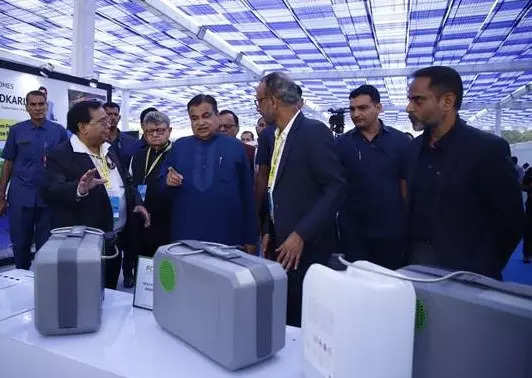
Union Minister for Road Transport & Highways Nitin Gadkari on Thursday inaugurated International Methanol Seminar and Expo, organised by NITI Aayog in New Delhi.
Addressing the seminar, Gadkari emphasized two key concerns: rising pollution and fossil fuel imports. He underscored the urgent need to reduce these imports for self-sufficiency, which amounts to about ₹22 lakh crore, especially in light of global geopolitical uncertainties. He highlighted the importance of biofuels in achieving energy independence, bolstering the agricultural economy, and ensuring the prosperity of India’s farmers. He also mentioned that India’s logistics costs can be reduced by using alternative fuels such as methanol, ethanol, and bio-CNG.
The minister said that India is making significant strides in the biofuel sector, especially in methanol. He noted that NITI Aayog’s efforts to promote methanol are yielding success, given its affordability and pollution-free nature. Low quality Coal, which is available in few states, is also being used in making methanol, he added.
Gadkari said the concept of converting waste into wealth and highlighted that materials like used tyre powder and plastic are being utilized in road construction, which helps in reduction of bitumen imports. He also emphasized how the initiative of using crop waste is helping to increase the incomes of farmers across the country.
The minister emphasized the significance of waste-to-energy technologies, particularly the production of bio-CNG from rice straw. This approach has shown promise in 475 projects, with over 40 already up and running in states such as Punjab, Haryana, western Uttar Pradesh, and Karnataka. The conversion ratio of rice straw to Bio-CNG is roughly 5:1 in tonnes. The Union minister also urged for additional research into more efficient biomass sources and cost-effective transportation methods for biomass.
Gadkari spoke about the stubble burning problem in Punjab and Haryana. He said that right now, we can process one-fifth of the Parali, but with better planning, we can reduce the seasonal air pollution from stubble burning by using parali as raw material for alternative fuels. He said that India needs to move ahead with a policy which is cost-effective, indigenous, imports substitute based and employment generating to address the major issues of rising pollution and fossil fuel imports.
Gadkari appreciated NITI Aayog for organising the international seminar and expo on methanol. Suman Bery, Vice Chairman of NITI Aayog, VK Saraswat, Member NITI Aayog, Ajay Kumar Sood, Principal Scientific Advisor to the Government of India were present on the occasion.


